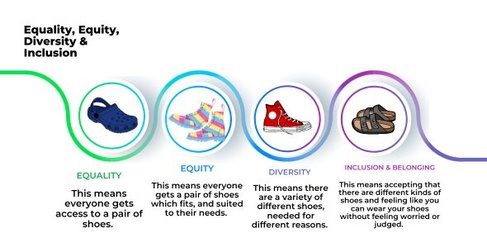EDI in the Department

The University's People Strategy reflects the mission and values of "Freedom of thought and expression" "Freedom from discrimination"
Equality, diversity and inclusion are not listed as a separate theme but form a ‘golden thread’ that runs through everything the University does. The workforce consists of academic, research and professional services colleagues. This strategy seeks to enable people to maximise their potential in support of the University’s mission to contribute to society through the pursuit of education, learning and research at the highest international levels of excellence.
The Department's EDI Action Plan for 2026 - 2027, is currently being shaped by the Committee, using data and in line with the University's Equal Opportunities Policy, Equality Act 2010 and Freedom of Speech Policy.
What does EDI mean?
Equality: Ensuring everyone has the same opportunities and is treated equally, without discrimination. It focuses on providing resources to individuals and groups to create an equal playing field to allow people to succeed.
Equity: Recognises that each person has different circumstances and allocates the exact resources and opportunities needed to reach an equal outcome. It's about fairness and justice, ensuring everyone has what they need to succeed.
Diversity: A range of individuals in a setting, from different backgrounds. This can include differences in race, gender, age, sexual orientation, disability, religion, and more. Diversity is about recognising and valuing these differences.
Inclusion: Creating environments in which any individual or group can be and feel welcomed, respected, supported, and valued. It's about ensuring diverse individuals can participate fully in the decision-making processes and development opportunities within an organisation or group.
Interested in more terminology? This can be found here.
Freedom of Speech
The University upholds the principles of freedom of speech and academic freedom, which are essential to the pursuit of knowledge, critical inquiry, and open debate. These freedoms allow individuals to express ideas, challenge assumptions, and engage in meaningful dialogue. In relation to academic staff at the University, it means their freedom within the law to question and test received wisdom, and to put forward new ideas and controversial or unpopular opinions, without loss of their jobs or privileges at the University, or the likelihood of their securing promotion or different jobs at the University being reduced.
